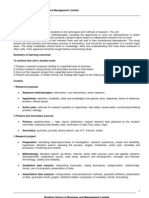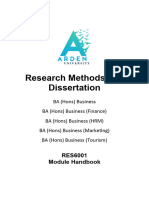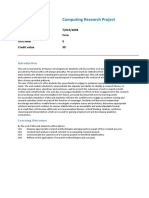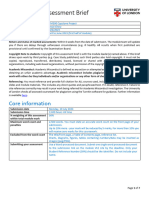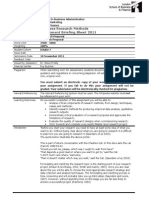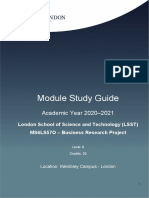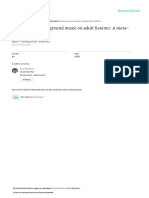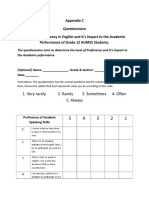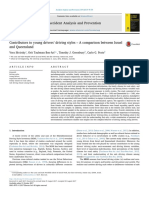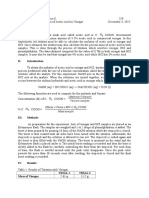Research Methods Module – SOE11131
1
�Contents
Introduction
Communication Arrangements
Aim and Learning Outcomes
Lecture and Workshop Arrangements
Assignment and Learning Outcomes
Submissions
Marking Criteria
Extension Requests
Mitigating Circumstances
Plagiarism
Reading List
2
�Introduction
This module runs in Trimester 1 and is worth 20 credits. Whilst this is a stand-alone
module, Research Methods is the first stage of your dissertation. During this module
you will have the opportunity to learn about the research process. Specifically, we will
look at how you might decide on a topic of research, the various approaches to
critically reviewing existing literature and, importantly, how you might approach the
gathering of primary data. We will also identify and discuss the various methods of
analysing data and drawing relevant and appropriate conclusions. The assessment
for this module is the creation of a research proposal that will provide you with a clear
direction for approaching the dissertation.
As with all modules, you will get more from this if you undertake prior reading and
participate in lectures and tutorials.
Communication
In addition to the lectures and tutorials, the main form of communication for this
module will be through Moodle. Notices regarding the module, module materials and
other relevant information will all be circulated via this virtual learning environment.
This module will be taught by a team of lecturers. If you want to speak with a lecturer,
then do so after the lecture. They will be happy to talk with you. For any other module
issues please contact me at: m.dutton@napier.ac.uk.
Dr. Matthew Dutton
Room 2/46
Craiglockhart Campus
Telephone: 0131 455 4317
e-mail: m.dutton@napier.ac.uk
3
�Aim and Learning Outcomes
The overall aim of this module is to prepare you to undertake research in one or more
areas of Business and Management.
The module delivery includes a variety of teaching and learning methods which will
encourage active participation. In addition to the above academic aim, this module
aims to promote a variety of transferable skills, as noted in the LTA Approach section
of the Module Descriptor.
This academic aim is supported by learning outcomes which describe the skills and
knowledge that you will have acquired on completion of this module.
Learning Outcomes:
On completion of this module, you will be able to:
identify an appropriate research topic;
evaluate different approaches and methodologies of research;
critically review relevant literature; design and plan research; and collect
appropriate data;
evaluate various methods of data analysis;
form appropriate conclusions and recommendations;
understand the requirements for writing up and disseminating research.
Lecture and Workshops Arrangements
The lecture and workshops will be given on your timetable.
The following section of this information pack discusses the scheme of work, which
condenses the above ideas into a learning agenda.
4
�Assignments and Learning Outcomes
The Learning Outcomes as described and discussed in the previous section are
addressed in a Scheme of Work which includes the following components:
1. A series of lectures that address the main issue related to achieving the learning
outcomes;
2. Practical sessions on how to use statistical software for quantitative analysis;
3. An outline research template;
4. A research proposal.
To do well in this module, it is in your interest to read and understand the course
material. Lectures can only introduce what you need to learn to complete a
successful dissertation. The dissertation process requires you to develop an
independent approach to research and learning. The materials we cover in lectures
should be used as the start of your learning.
Submissions
The outline research proposal is not graded. It is designed to get you thinking about:
your project title; related modules; the rationale for conducting the research; aims
and objectives; methodology. The proposal is an important first step in deciding on
the direction of your research. The outline also allows potential supervisors to give
feedback on your ideas and for you to clarify and refine your research topic in
conversation with them.
The research proposal accounts for 100% of the grades for this module. It is the basis
for the dissertation. At this stage you are setting out in detail what you intend to do in
the final dissertation. The chosen research topic must relate to one or more of the
academic areas covered by your Masters programme. In the proposal, you are
asked to set out you’re aims and objectives; the identification of key literature; your
research approach; research plan; reference list.
The proposal is designed to get you to think through in detail about the research you
are going to do and what methods and methodologies you are going to use to deliver
the research. The proposal will also allow module leaders to identify an appropriate
supervisor who will have expertise in the area you want to study. For example, if you
want to do research on the impact of tourism on the local environment using
qualitative interviews, then you’re allocated supervisor will have experience of
research in this area.
The maximum word count for the proposal is 4000 words and should follow the format
set out below.
5
�1. Title: Use a provisional title for the dissertation
The title should incorporate the main themes or issues that the research is going
to address.
2. Introduction - 10% weighting
In this section, you should contextualise the rationale for your proposed
research. For example:
What areas of your module are you drawing upon?
Key literature you are using to illustrate the academic underpinning of the
research.
The practitioner or work-based context that leads you to examine this topic.
Outline why you are choosing the area. Have you work experience or
personal interest in the topic?
What is the importance and relevance of the research? How might the
research address key issues in a business sector or organisations?
6
�3. Aim and Objectives - 20% weighting
A clear statement of the overall aim of the research, leading on from the
introduction. You should be able to summarise you’re aim in one or two brief
sentences.
Typically, there will be three or four objectives to enable you to achieve your
main aim and it is likely that these will incorporate an academic element. This
could mean ‘testing’ a hypothesis or basing your research/analysis on an
existing framework or theory. You might also want to incorporate a practical
perspective relating to the workplace, sector or organisation that your research
is focused on. The balance between the two is dependent on the research
topic selected, but the academic focus must be visible at this stage. A brief
justification of why the aims and objectives are appropriate is also useful to
clarify the focus of the proposal.
Remember, this is an academic piece of work and must reflect good
academic practice in your aims and objectives.
4. Identification and Review of Key Literature - 25% weighting
You are required to identify a minimum of ten key literature sources relevant to
your proposed research.
These sources could incorporate journal articles, textbooks, practitioner-based
articles, trade press, industry and organisation reports, company reports,
credible news media articles and/or relevant and credible websites. The use of
Edinburgh Napier’s online library resource to access journal articles is expected
and you should normally cite such articles as the core material in this section.
As I said earlier in this module guide, this is an academic piece of work. It is not
a company report or a consultant report. You are therefore expected to show
how you engage with and review academic, peer-reviewed journals and use
these to develop your research.
When writing this section, compare and contrast the literature (as you will
eventually do in the main project) using the APA citation style and ensure there
is continuity and a logical link between the references and themes introduced.
Cited authors should be listed in the references section at the end of the
proposal.
5. Research Approach - 25% weighting
Here you should outline the methodology and methods to be used in your
research. These should be supported by references to the research texts
relating to methods, a selection of which has been given in the lectures and
7
� on Moodle. More specifically, a clear indication of the methods of data
collection and analysis that you plan to use should be evident in this section.
You might consider the following in writing this section of your proposal:
Are you going to use a case study of a particular organisation or a smaller
number of organisations?
Will you carry out a survey of a large number of organisations in an industry to
explore the objectives and aims of your research?
Are you using mixed or single methods?
Why have you chosen the selected research method(s)?
What are the strengths and weaknesses of your research method(s)?
How are you going to analyse the data you have collected?
This section should also identify any ethical issues which need addressing in your
primary data collection e.g. anonymity, confidentiality, informed consent.
Anywhere in your research where there is human involvement requires you, as the
researcher, to consider how their involvement in your research may affect them.
You should ask yourself:
Is there a possibility of harm from involvement in the research?
Is there a possibility that research participants may become distressed by
involvement in the research?
How are you going to ensure that research participants give informed consent
to take part in the research?
How are you going to keep research data secure?
How are you going to ensure that research participants cannot be identified?
You should adhere to the guidelines of the University, and follow the guidelines on
research integrity that can be downloaded here:
http://staff.napier.ac.uk/faculties/business-school/research/Pages/Research-Integrity-
Governance.aspx
A copy of the University Code of Practice on Research Integrity is available in the
document download section of the Moodle site for this module. You should read
this to ensure that your research proposal complies with the Code.
8
�6. Research Plan - 10% weighting
You should identify the key events in your research plan and then provide a
concise and realistic timetable which shows how they are linked, when they will
take place and how long they will last. You can do this as a Microsoft Word table
or a Gantt Chart (e.g. Fisher, 2010: 87; Bryman and Bell, 2011:77-78), accounting
for each week and month between now until submission of the project.
This section may also contain additional commentary relating to any particular
characteristics of the research and its schedule that may need highlighting.
7. Reference List - 10% weighting, not counted as part of your word count
You should provide an alphabetical list of all references used in your research
proposal, based on the APA referencing system.
A guide to APA referencing is available in the module information section of
the Moodle site.
Take care when listing web references (which should be kept a minimum) to
include the author’s name, article title and date accessed.
Remember that University Regulations require students to gain a minimum
grade of P1 for each module taken, with no single assessment grade falling
below F1. In the unfortunate event of a failure in any module you can only do
ONE re-assessment for which the maximum grade that can be obtained is a
P1. Please see your Programme Handbook for more details.
9
� Marking Criteria
Distinction (D1 – D5)
In order to obtain a distinction, an excellent level of work will be evident in all of the
categories indicated on the assessment pro forma. That is, students will present a
quality research proposal that demonstrates a comprehensive knowledge and
understanding of the research process. Students will identify a suitable area of study
and provide a clear academic rationale for undertaking study in that particular area.
Students will articulate a clear aim which will be supported by a series of research
questions or objectives. An initial literature review will be provided that identifies the
seminal research and critically reviews previous studies in the chosen area. The
research approach will be clearly explained and critically evaluated and the
research plan will be realistic and appropriate for the study. In addition, the Research
Proposal will be well organised, structured and cohesive with extensive and
appropriate references.
Pass (P1-P5)
In order to obtain a passing grade a mark of 'satisfactory' will be achieved in most or
all of the categories indicated on the assessment pro-forma. That is, while students
will display a sound knowledge and understanding of the research process, there will
be gaps in some areas, sometimes insufficient application of theories and concepts,
and insufficient analysis and critique. Further, there will be lapses in structure and
cohesion and some omissions with regard to the identification, use and referencing of
key sources.
Fail (F1-F5)
In order to obtain a failed grade, a mark of 'poor' will be achieved in most or all of the
categories indicated in the assessment pro forma. That is, students will display
insufficient knowledge and understanding of the research process, often insufficient
application of theories and concepts, absent or insufficient critique or analysis,
confused structure and cohesion and limited use of referencing and support from the
literature.
10
� Extension Requests
I understand that sometimes exceptional circumstances can affect your ability to
submit on time.
Extensions may be granted for exceptional circumstances, and requests should be
made in advance to the module leader or supervisor, as early as possible.
However, please note that what is considered an ‘exceptional circumstance’ does
NOT include the following: ‘pressure of work’, ‘having lots of assessments to do’ or ‘my
computer crashed on the day of the assessment’. These are NOT considered valid
reasons for being given an extension. You are given details of all your assessments
weeks and sometimes months in advance. Time management and prioritisation are
important skills that you are expected to develop at university. Therefore, begin
preparation for your assessments early and do not leave them all until the final week.
Also I would advise you to save more than one copy of your assessment. If your
computer crashes or you lose your memory stick with your only copy of your
assessment on the day the assessment is due to be handed in – please be aware that
this will not be viewed as an emergency – but as poor planning! Back up ALL your
work on a regular basis.
Finally, extensions should be asked for as far in advance as possible i.e. as soon as you
realise that the assessment deadline will not be met. It is extremely unlikely that you
will be given an extension if you ask for one after the assessment deadline, except
under very exceptional circumstances.
Mitigating Circumstances
Requests for extensions beyond a week will need to be agreed by the Mitigating
Circumstances board; you will find details of how to request mitigating circumstances
extensions in your Programme Handbook or on the University Intranet. Keep the
module leader informed if you intend to request longer extensions through mitigating
circumstances.
11
� Plagiarism
Plagiarism is the dishonest use of someone else’s words, thoughts or ideas without
acknowledgement. Plagiarism is viewed seriously by Edinburgh Napier University and
students can face disciplinary action in the event of established or suspected
plagiarism. Edinburgh Napier University has a Guide on Plagiarism and you should
ensure that you refer to this Guide for further information on this important issue.
Supervisors are experienced at identifying cases of plagiarism. We do not rely solely
on Turnitin to assess if student work is not their own. If a supervisors suspects that a
student has not done the work they submit, you may be called in for an oral exam of
your dissertation where you will be examined on the content of your work.
Reading list
The following provides a selection of texts and other sources of information that should
guide you in your reading and research in this module. It is not intended to be a
definitive reading list or complete list of all sources. Indeed, the range of information
sources that have some relevance to this module is extensive. Additional information
sources will be provided during lectures and tutorials and should also be provided by
you and your colleagues.
Texts
Bryman, A. and Bell, E. (2015). Business Research Methods. (4rd ed.). London:
Oxford
Fisher, C. (2010). Researching and Writing a Dissertation: An Essential
Guide for Business Students. (3rd ed.). Essex: Pearson Education
Hussey, J. and Hussey, R. (2003). Business Research: A Practical Guide for
Undergraduate and Postgraduate Students. (2nd ed.). Basingstoke:
Macmillan Business
Maylor, H. and Blackmon, K. (2005). Researching Business and Management.
Basingstoke: Palgrave Macmillan
Robson, C. (2002). Real World Research. Blackwell Publishing: UK
Saunders, M., Lewis, P. and Thornhill, A. (2012). Research Methods for Business
Students. (6th ed.). London: FT Prentice Hall
12











